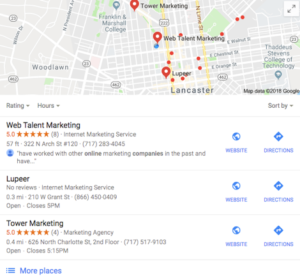If you oversee Local SEO for your company, it is important to understand the impact it can have on business. Here are a few numbers to consider:
- 46% of all searches made on Google have local intent
- Among users who perform a local search, half of them visit a business within one day
- Almost 80% of local searches made on a mobile device result in an offline purchase
Ultimately, if you are not putting effort into Local SEO, you are missing out on a large opportunity. Local SEO may be the most effective driver of traffic to your business, both online and to your physical storefront.
Local Citations
Part of Local SEO is the creation and maintenance of Local Citations – mentions of your business information online. They strengthen your local visibility and increase your ranking in the SERP map-pack.

When creating local citations for your business, there are certain pitfalls to navigate to ensure the effectiveness of your efforts. Here are a few common mistakes to avoid with creating local citations.
No Google My Business Profile
This tops the list because of how important a GMB profile is as a local citation. According to Moz, Google My Business information accounts for nearly 20% of local ranking signals on Google. It is the primary source from which Google pulls your business information for local searches, not your website itself!
Fortunately, if you haven’t created or claimed your business’ GMB profile, it is quite easy to do. You can set up your account directly with Google and follow their step-by-step process. It’s 100% free and does not take long to complete. If you’re encountering problems while attempting to claim your profile our experts have you covered.
Incorrect or Missing Information
Whether it’s on Google, Yelp, or one of the other numerous local citation sites, accuracy and consistency of your business information is crucial. You should ensure that your company’s NAP information (Name, Address, and Phone Number) is correct, up-to-date, and appears the same across every local citation you create.
This is not only important for Google to accurately display your business information, it affects users as well. Consider this real-life example of this scenario:
A portion of our team attended a trade show in NYC in January. They made reservations at a restaurant but were running late, and wanted to call and change their reservation. They Googled the restaurant to try and find their contact information, but the phone number listed on their GMB profile was a dead line. They looked for other citations but could find none, and could not get in contact with the restaurant. As a result, they missed their reservation.
Revenue-losing situations like this can be avoided with proper, up-to-date local citations.
Not Claiming Your Business’ Citations
Claiming local citations is an important detail as you want to be only one who controls your business information online. Unclaimed citations could leave the door open for your competitors to change your information in order to mislead your customers, or worse, steal them for their own business.
Fortunately, claiming local citations is usually an easy task. In many cases, it can be accomplished by setting up an account on that website or with a phone call. I recommend visiting Acxiom’s website and claiming your business listing there as well. Acxiom is one of the main data aggregators of U.S. businesses that Google draws information from.
Claiming local citations is also helpful in the case that you need to update your business information. Whether you’ve moved offices, got a new phone number, etc., having ownership of those citations will make updating them much easier.
Duplicate Listings
You may come across websites or local directories that have two or more pre-existing listings for your business. Often times, these duplicates will have conflicting business information. Duplicate listings happen for a variety of reasons, but they are an important thing to address. Some reasons why they are problematic:
- Google and other search engines could view duplicates as spam and penalize your account.
- They can potentially confuse or misguide users, resulting in lost business.
- Duplicate listings with incorrect information may lead to more incorrect listings, as many directories feed information to each other.
If you find duplicate listings for your business, you may be able to have them removed directly on the website. Otherwise, you can contact the webmaster to try and have the problem resolved.
Choosing Incorrect Business Categories
You want to present your business as accurately as you can, for both users and search engines. Selecting appropriate business categories for your local citations is one way to achieve that.
With many local citation opportunities (including Google and Yahoo), you have the ability to select a category or categories for your business to fall under. Selecting the wrong categories for your business may make it harder for qualified users to find your information and for search engines to classify your business for local search.
You know your business better than anyone else. Use that knowledge to your advantage!
In Conclusion
Since 80% of local searches showcase some sort of purchase intent, choosing not to focus on acquiring this traffic could prevent your business from reaching new consumers. Focusing on Local SEO may help you achieve your growth goals in 2018. Ultimately, creating local citations is a vital exercise to increasing local traffic to your website and business. Be sure to avoid these common mistakes to ensure the maximum effectiveness of your local citations and your overall Local SEO strategy.
